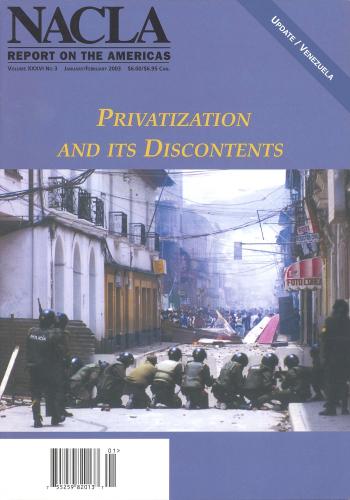Report
Why do governments need to borrow money from the IDB when a public enterprise is sold off to private buyers? The IDB loans pay for the menu of things necessary to make a sale appealing both to those that previously profited from public ownership and to new for-profit private operators.
Two separate and very different ideas about economic development and workers rights have emerged in Mexico. The differences are deep, over whose priorities will prevail—those of workers or those of investors with a stake in the free-trade based economy.
According to the Inter-American Development Bank, the regional inter-governmental bank and largest multilateral lender for Latin America, Latin America is poor because its people are inadequately educated, sick and stuck. According to almost everyone else, most Latin Americans are uneducated, sick and stuck because they are poor and not the other way around, but the IDB has the billions, so what it says goes.
Neoliberalism has not always ruled the world. In Latin America the wholesale privatization of state companies, from water supplies to electricity grids, from manufacturing to telecommunications, is of recent origin.
The officials of the Inter-American Development Bank make their recommendations from Washington where their headquarters sits at the corner of 13th Street and New York Avenue, five blocks east of the World Bank and two blocks from its real Mission Control at the U.S. Department of the Treasury.
Argentina began an international railroad privatization trend in 1991, when its Rosario to Bahía Blanca line was turned over to a private concession, and its example had been followed in at least 13 other nations by the end of the decade.
In the 1930s and 40s, General Lázaro Cárdenas made nationalization of economic resources and land reform symbols of Mexican national sovereignty. Independence from the colossus of the North, Cárdenas said, meant prying the hands of U.S. owners from the main levers of the country’s economic life.
Before April 2000, few people outside of Bolivia had ever heard of Cochabamba, a city of 600,000 tucked away in the Andes. Four months into the new century Cochabamba became a powerful symbol in the rising rebellion against privatization.
Emcali is the public company that provides water, energy and telecom services to two million people in and around Cali, Colombia and good jobs at good wages to nearly 3,000 public workers. These workers are virtually 100 percent organized and belong to SINTRAEMCALI, a public service union fighting a long-standing battle against the privatization of the company.
In El Salvador, efforts to put the public health system into private hands have provoked a wave of opposition: Last September 18, unionized doctors and workers at the Social Security Hospital in San Salvador, the capital, began an unprecedented joint strike in opposition to the privatization of the national system of which the hospital is a part.
When the Vásquez family’s phone line was installed in mid-1990, they threw a party. After all, they’d paid $1,000 and waited seven years, and the installation put them in a privileged group in their low-income Lima neighborhood.

